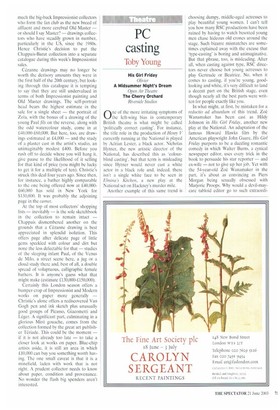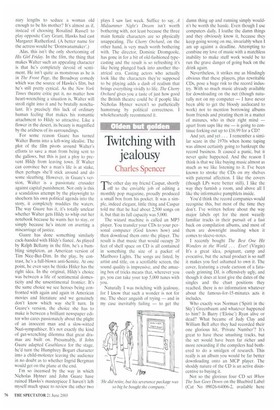PC casting
Toby Young
His Girl Friday OliLier A Midsummer Night's Dream Open Air Theatre The Cherry Orchard Riverside Studios
Qne of the more irritating symptoms of the left-wing bias in contemporary British theatre is what might be called 'politically correct casting'. For instance, the title role in the production of Henry V currently running at the National is played by Adrian Lester, a black actor, Nicholas Hytner, the new artistic director of the National, has described this as 'colourblind casting', but that term is misleading since Hytner would never cast a white actor in a black role and, indeed, there isn't a single white face to he seen in Elmina's Kitchen, a new play at the National set on Hackney's murder mile.
Another example of this same trend is choosing dumpy, middle-aged actresses to play beautiful young women. I can't tell you how many RSC productions have been ruined by having to watch besotted young men chase hideous old crones around the stage. Such bizarre mismatches are sometimes explained away with the excuse that 'type-casting' is boring and unimaginative. But that phrase, too, is misleading. After all, when casting against type, RSC directors never choose hot young actresses to play Gertrude or Beatrice. No, when it comes to casting, if you're young, goodlooking and white, it's very difficult to land a decent part on the British stage, even though nearly all the best parts were written for people exactly like you.
In what might, at first, be mistaken for a reductio ad absurdum of this trend, Zoe Wanamaker has been cast as Hildy Johnson in His Girl Friday, another new play at the National. An adaptation of the famous Howard Hawks film by the American playwright John Guare, His Girl Friday purports to be a dazzling romantic comedy in which Walter Burns, a cynical newspaper editor, uses every trick in the book to persuade his star reporter — and ex-wife — not to give up her job. Yet with the 54-year-old Zoe Wanamaker in the part, it's about as convincing as Piers Morgan being sexually obsessed with Marjorie Proops. Why would a devil-maycare tabloid editor go to such extraordi nary lengths to seduce a woman old enough to be his mother? It's almost as if, instead of choosing Rosalind Russell to play opposite Cary Grant, Hawks had cast Margaret Rutherford. (A better name for the actress would be Dontwanamaker.) Alas, this isn't the only shortcoming of His Girl Friday, In the film, the thing that makes Walter such an appealing character is that he's completely devoid of sentiment. He isn't quite as monstrous as he is in The Front Page, the Broadway comedy which was the source of Hawks's film, but he's still pretty cynical. As the New York Times theatre critic put it. no matter how heart-wrenching a situation is, Walter will stroll right into it and be brutally nonchalant. It's precisely this lack of ordinary human feeling that makes his romantic attachment to Hildy so attractive. Like a flower in the desert, its beauty is magnified by the aridness of its surroundings.
For some reason Guare has turned Walter Burns into a left-wing idealist. The plot of the film pivots around Walter's efforts to save a man from being sent to the gallows, but this is just a ploy to prevent Hildy from leaving town. If Walter can convince her a man's life is at stake, then perhaps she'll stick around and do some sleuthing. However, in Guare's version, Walter is a passionate crusader against capital punishment. Not only is this a scandalous attempt by the playwright to shoehorn his own political agenda into the story, it completely muddies the waters. The way Guare has it, it's totally unclear whether Walter gets Hildy to whip out her notebook because he wants her to stay, or simply because he's intent on averting a miscarriage of justice.
Guare has done something similarly cack-handed with Hildy's fiancé. As played by Ralph Bellamy in the film, he's a bumbling simpleton, an American version of Tim Nice-But-Dim. In the play, by contrast, he's a full-blown anti-Semite. At one point, he even says he thinks Hitler has the right idea. In the original, Hildy's choice was between a life of sentimental domesticity and the unsentimental frontier. It's the same choice we see heroes being confronted with again and again in American movies and literature and we genuinely don't know which way she'll turn. In Guare's version, the choice she has to make is between a brilliant newspaper editor who cares passionately about the plight of an innocent man and a slow-witted Nazi-sympathiser. It's not exactly the kind of gut-wrenching dilemma that great dramas are built on. Presumably, if John Guare adapted Casablanca for the stage, he'd turn the Humphrey Bogart character into a child-molester leaving the audience in no doubt as to whether Ingrid Bergman would get on the plane at the end.
I'm so incensed by the way in which Nicholas Hytner and John Guare have ruined Hawks's masterpiece I haven't left myself much space to review the other two
plays I saw last week. Suffice to say, A Midsummer Night's Dream isn't worth bothering with, not least because the three main female characters are so physically unappealing. The Cherry Orchard, on the other hand, is very much worth bothering with. The director, Dominic Dromgoole, has gone in for a bit of old-fashioned typecasting and the result is so refreshing it's like being plunged back into another theatrical era. Casting actors who actually look like the characters they're supposed to be playing adds a dash of realism that brings everything vividly to life, The Cherry Orchard gives you a taste of just how good the British theatre could be if people like Nicholas Hytner weren't so pathetically hamstrung by political correctness, I wholeheartedly recommend it.



































































































 Previous page
Previous page